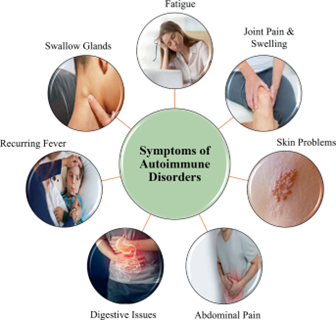Autoimmune Disorders and its Management
M3 India Newsdesk Nov 29, 2024
This article examines the important impact of diet on autoimmune disorders, conditions in which the immune system mistakenly attacks the body’s tissues. It provides practical insights into dietary interventions that complement medical treatments, improving patient outcomes.
Autoimmune disorders are conditions where the body's immune system mistakenly attacks its tissues and organs. Common autoimmune diseases include rheumatoid arthritis, systemic lupus erythematosus (SLE), celiac disease, and multiple sclerosis (MS).
The precise cause of these conditions is often unclear, but genetics, infections, and environmental factors like diet play significant roles. Emerging research suggests that diet can significantly affect immune function and inflammation, potentially exacerbating or alleviating symptoms of autoimmune disorders.
The role of diet in immune function
Diet influences immune function through several mechanisms, including the modulation of gut health, nutrient availability, and systemic inflammation. The gastrointestinal tract is central to immune function since 70-80% of immune cells reside there, and the gut microbiota plays a crucial role in regulating immune responses.

Key dietary components and their effects include:
- Omega-3 fatty acids: Found in fatty fish, flaxseeds, and walnuts, omega-3s have anti-inflammatory properties. Studies indicate that a diet high in omega-3s can lower the levels of inflammatory markers like C-reactive protein (CRP) and cytokines in patients with autoimmune diseases such as rheumatoid arthritis.
- Gluten: Gluten can be particularly harmful to those with celiac disease, an autoimmune disorder where the immune system attacks the small intestine upon gluten ingestion. Even in non-celiac autoimmune conditions, gluten sensitivity has been linked to exacerbated inflammation.
- Vitamin A (beta-carotene): Vitamin A regulates the immune system by influencing T-cell differentiation and promoting regulatory T-cells, helping to prevent autoimmune attacks. It also strengthens the integrity of gut barriers, reducing autoimmune-triggering inflammation. Adequate intake can lower the risk of autoimmune flare-ups, reduce oxidative stress, and protect against infections. It also supports epithelial function, crucial for maintaining tissue integrity in autoimmune conditions. Sources are Carrots, sweet potatoes, spinach, and kale.
- Vitamin E: Vitamin E protects cell membranes from oxidative damage by neutralising free radicals and modulates inflammatory responses in autoimmune conditions. It reduces the overactivation of immune cells involved in inflammation. Vitamin E has been shown to decrease inflammatory markers like TNF-alpha and IL-6, reducing symptoms such as joint pain and fatigue in conditions like rheumatoid arthritis. It also protects against cellular damage. Sources are Almonds, sunflower seeds, and avocados.
- Vitamin C: Vitamin C supports immune defence by enhancing phagocyte function and promoting the production of antiviral proteins like interferon. It also helps regenerate vitamin E, boosting overall antioxidant capacity. It reduces oxidative stress and inflammation in autoimmune diseases and supports collagen synthesis, crucial for connective tissue health in diseases like lupus. Vitamin C also improves immune regulation. Sources are Citrus fruits, strawberries, and bell peppers.
- Polyphenols: Polyphenols modulate immune responses by inhibiting pro-inflammatory cytokines and enzymes, reducing inflammation. They also support gut health, which is critical in controlling autoimmune-related gut inflammation. These compounds help lower chronic inflammation and oxidative stress, contributing to better management of autoimmune conditions. They also improve gut barrier integrity, reducing symptoms in diseases like celiac and Crohn's disease. Sources are Berries, green tea, dark chocolate, and olive oil.
- Vitamin D: A deficiency in vitamin D has been linked to the onset and progression of autoimmune diseases such as multiple sclerosis and lupus. Vitamin D helps regulate the immune system by promoting the differentiation of T-regulatory cells, which play a key role in preventing autoimmune reactions.

Dietary patterns that influence autoimmunity
Several dietary patterns have been researched for their impact on autoimmune conditions, focusing on how they modulate inflammation and immune function:
- Mediterranean diet: High in fruits, vegetables, whole grains, legumes, olive oil, and fish, this diet has anti-inflammatory effects. Studies have shown its benefits in reducing the progression of rheumatoid arthritis and improving quality of life in autoimmune patients.
- Paleo diet: This diet eliminates grains, dairy, and legumes, focusing on whole, unprocessed foods. Some studies suggest that this approach may reduce gut permeability (leaky gut), which is linked to autoimmunity, though long-term effects remain unclear.
- Low FODMAP diet: Initially developed for irritable bowel syndrome, a low FODMAP diet can also be beneficial for autoimmune patients, especially those with gastrointestinal symptoms. By reducing fermentable oligosaccharides, disaccharides, monosaccharides, and polyols, this diet can help minimise gut inflammation and restore gut barrier integrity.
Case study 1: Rheumatoid arthritis and omega-3s
A 45-year-old female patient with rheumatoid arthritis (RA) presented with severe joint pain and elevated inflammatory markers (CRP and ESR). She was advised to incorporate omega-3 fatty acids into her diet by consuming fatty fish (such as salmon) and supplementing with fish oil.
After 12 weeks of dietary intervention, her CRP levels significantly decreased, and her joint pain reduced by 40%, allowing her to decrease her reliance on non-steroidal anti-inflammatory drugs (NSAIDs).
Case study 2: Celiac disease and gluten-free diet
A 32-year-old male patient diagnosed with celiac disease struggled with severe gastrointestinal symptoms and malnutrition.
Upon following a strict gluten-free diet, avoiding all wheat, barley, and rye, his symptoms improved within a few weeks.
Additionally, his nutrient absorption improved, as evidenced by increased serum iron and vitamin B12 levels.
Case study 3: Lupus and antioxidants
A 28-year-old woman with systemic lupus erythematosus (SLE) reported frequent flare-ups, characterised by fatigue, joint pain, and rashes. She was advised to increase her intake of antioxidant-rich foods, including berries, dark leafy greens, and nuts.
Over six months, her flare-ups reduced in frequency, and she experienced improved energy levels and fewer inflammatory skin reactions.
Conclusion
Diet plays a critical role in managing autoimmune disorders by influencing immune function and inflammation. Dietary interventions, such as increasing omega-3 fatty acids, adopting a gluten-free diet, and focusing on antioxidant-rich foods, can provide significant relief to patients. Further research, especially in Indian populations, is needed to establish specific dietary guidelines tailored to cultural and regional eating patterns. Ultimately, personalised nutrition can complement medical treatment to enhance the quality of life in patients with autoimmune diseases.
Disclaimer- The views and opinions expressed in this article are those of the author and do not necessarily reflect the official policy or position of M3 India.
The author of this article: Ms Rutambhara Nhawkar is a Clinical Dietician, M. Sc. (Clinical Nutrition & Dietetics), Certified Diabetes Educator and a medical writer from Pune.
-
Exclusive Write-ups & Webinars by KOLs
-
Daily Quiz by specialty
-
Paid Market Research Surveys
-
Case discussions, News & Journals' summaries